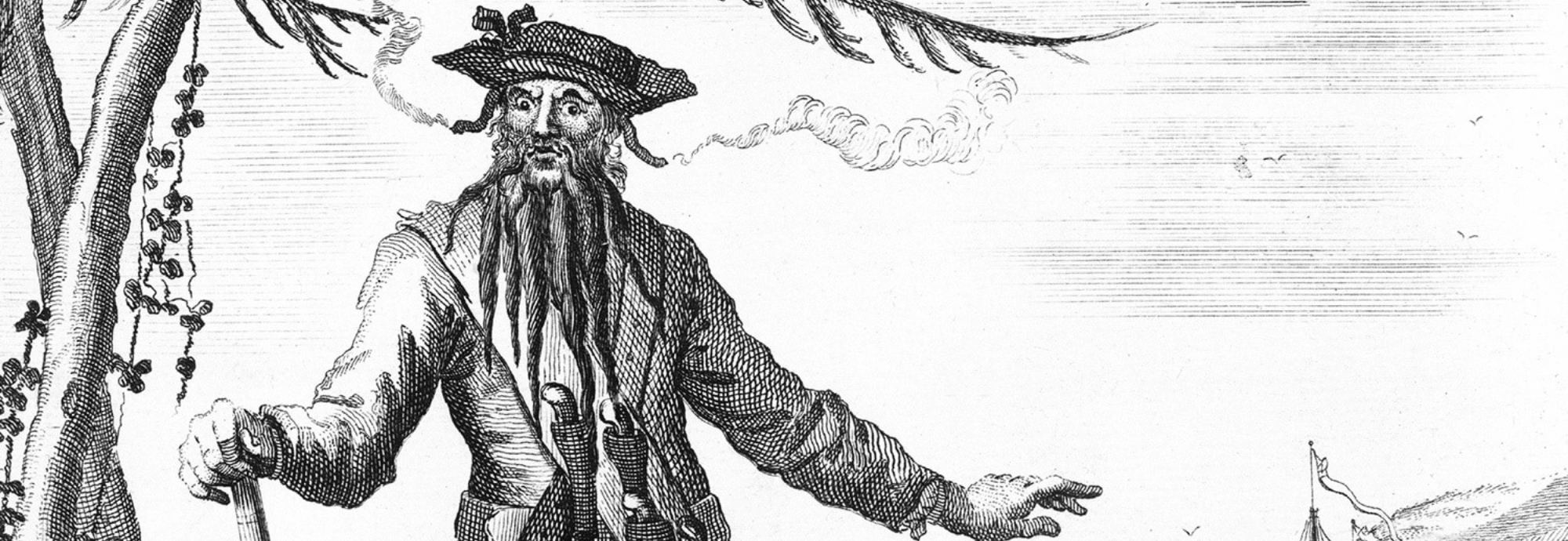

Our Autumn Lecture Series concludes this month with a talk that examines the myths and truths behind the popular pirate image. Dr Richard Blakemore will explore pirate codes, elusive buried treasure, talking parrots, and the walking of the plank.
We caught up with Dr Blakemore to find out more about the talk, and catch a glimpse into the fascinating world of the Golden Age of Pirates.
My aim in the lecture is to think about two questions: why has one period in history (roughly 1650-1730) come to define our popular image of pirates, and how much does this image really match what we know about that history? We’ll look at some popular myths about piracy, including buried treasure, walking the plank, black flags, and pirate codes. Did any of those things really happen, and why have they left such an impression on us today?
We know a surprising amount about some pirates, but we have to be very careful with the surviving historical evidence. Piracy was a big problem for imperial governments and colonial authorities in the seventeenth and eighteenth centuries, so there is a lot of paperwork about it: official reports and correspondence, witness depositions, trial records. There was also considerable ‘media coverage’ in newspapers, theatre, ballads, and popular books like The General History of the Pirates (published in 1724). Both the official documents and the popular literature, however, present pirates in a certain way, to sensationalise or to suit their own agenda. As historians, we need to keep that in mind when we analyse this evidence.
Quite a few – though it depends what you mean by ‘pirate’, of course! We’ll talk about Francis Drake, Henry Morgan, Henry Every, William Kidd, Blackbeard (Edward Thatch), Bartholomew Roberts, Calico Jack, Anne Bonny, and Mary Read. Maybe one or two others if I can fit them in…
It’s a fascinating question, isn’t it? Piracy is really all about violence and theft. You wouldn’t expect it to be so popular – and it was certainly seen as threatening when it happened. The contemporary ‘media coverage’ that I mentioned has had an enormous impact in popular culture, from literature like Treasure Island through to Hollywood and modern computer games, so I think part of the appeal is the instant recognisability of a pirate figure due to its wide currency. Everybody knows what a pirate is. Another dimension, I think, is that so much is aimed at children, who are really drawn to it (at least my son is!). That makes it into something familiar and fun throughout the rest of your life.
In the seventeenth and eighteenth centuries, ‘piracy’ was often a way to talk about other things, like politics, or law, or gender, and that’s still the case today. For example, how pirates are presented has changed (in some aspects) from the Hollywood swashbucklers of the 1940s-50s to the twenty-first-century Pirates of the Caribbean franchise, even while that franchise deliberately modelled itself on the earlier films visually. I think it’s interesting that in the late 1990s and early 2000s pirate culture was almost always aimed at children, but in the last few years (with the Hell Cats podcast, Black Sails, or Our Flag Means Death) they are targeted towards a grown-up audience. Our depictions of piracy always reflect the concerns of our own time, and I think that’s going to continue.

Dr Richard Blakemore
Dr Richard Blakemore is Associate Professor in Social and Maritime History at the University of Reading. His research focuses on seafarers during the seventeenth and eighteenth centuries, and he has published books and articles on the British civil wars at sea, Atlantic piracy, trade and violence in West Africa, wages and economics in shipping, and maritime law.
The final talk in our Autumn Lecture Series for 2023, Did Pirates Bury Their Treasure? takes place on Thursday 9 November at 7.30pm.
You can book tickets to the in-person event in the Museum’s Lecture Theatre or buy a ticket to stream the talk online. National Maritime Museum Cornwall Members receive a 10% discount on in-person tickets. You can buy tickets here.

National Maritime
Museum Cornwall Trust
Discovery Quay
Falmouth Cornwall
TR11 3QY
View Map
See our opening hours
Tel: +44(0)1326 313388
Email: enquiries@nmmc.co.uk